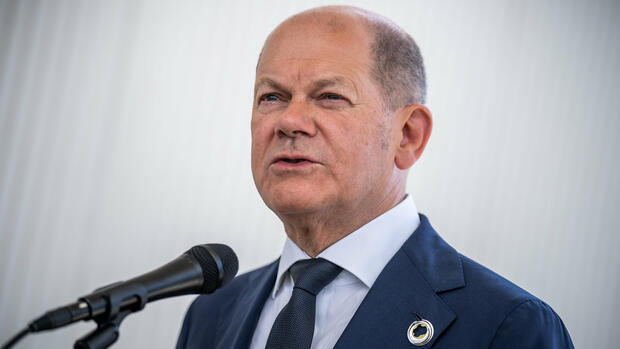According to the draft law already passed by the Federal Cabinet, from 2024 every newly installed heating system should be operated with at least 65 percent green energy.
(Photo: dpa)
Hiroshima Federal Chancellor Olaf Scholz does not believe in major changes to the heating law discussed in the traffic light groups. The factions of the SPD, Greens and FDP are now checking the law for unanswered questions, Scholz said on Sunday on the sidelines of the G7 summit in Hiroshima in a ZDF interview. But many legitimate concerns and concerns have already been dispelled.
“I don’t think it comes down to making big changes at the core, though,” he said. The SPD politician made a similar statement in an interview with RTL/ntv. There the Chancellor also emphasized that many precautions had been taken so that “a great many different technologies could be used”.
After clear criticism from the federal states, the Ministry of Economics had previously signaled that it would give in on some points. For example, they want to allow a combination of oil or gas boilers with heat pumps on a permanent basis.
After the departure of State Secretary for Energy Patrick Graichen, the architect of the draft, the FDP had doubts about quick advice. However, the Greens and SPD are insisting on the timetable and want it to be passed before the parliamentary summer recess.
According to the draft law already passed by the Federal Cabinet, from 2024 every newly installed heating system should be operated with 65 percent green energy. This should apply to all owners up to the age of 80. Existing oil and gas heating systems can continue to be operated and broken ones can be repaired. According to the Ministry of Economic Affairs, the switch should be socially cushioned by subsidies.
“Sure” said Scholz in the ZDF interview when asked whether Economics Minister Robert Habeck (Greens) still had the necessary political weight for the task.
Scholz said most of the concerns currently being discussed are no longer justified in light of the current draft law. “But they refer to a rough draft that was not intended for publication at all”. It is now a “completely normal parliamentary procedure,” he said with a view to possible changes.
The chancellor referred to a statement by former SPD parliamentary group leader Peter Struck, according to which no law leaves the Bundestag in the way the federal government introduced it. “And that’s how it should be in a democracy,” said Scholz.
Climate researcher advises to restart
The climate researcher Ottmar Edenhofer advocates that the federal government give up its controversial heating law and restart the project. “The traffic light got tangled up in climate protection,” said the director of the Potsdam Institute for Climate Impact Research (PIK) of the “Neue Osnabrücker Zeitung”. “My recommendation would be to take a deep breath, take a step back and start the heating transition again.”
Edenhofer spoke out in favor of controlling the price for the emission of climate-damaging carbon dioxide (CO2). “Letting the national emissions trading with emission upper limits work immediately is wiser than the ban and bid policy.”
This could cap the price increase. “With the BEHG, the government really has all the legal options in its hands.” Then people would switch to less CO2-intensive heating systems of their own accord.
The climate researcher said he often hears that higher CO2 prices cannot be enforced politically. “But even detailed regulations, such as the Heating Exchange Act, annoy people and are difficult to enforce. Clear communication from the government explaining to people why heating with gas has to become more expensive, what price increases are to be expected and who is protected from the price increases with which reimbursements would be accepted by the population.”
More: “100 more questions for Habeck” – new traffic light dispute about the heating law
